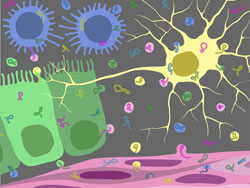 The NIH Common Fund has established a new program on extracellular RNA (exRNA) communication. The program seeks to discover fundamental biological principles of the mechanisms of exRNA generation, secretion and transport; to identify and develop a catalog of exRNA found in normal human body fluids; and to investigate the potential for using exRNAs in the clinic as therapeutic molecules or as disease biomarkers.
The NIH Common Fund has established a new program on extracellular RNA (exRNA) communication. The program seeks to discover fundamental biological principles of the mechanisms of exRNA generation, secretion and transport; to identify and develop a catalog of exRNA found in normal human body fluids; and to investigate the potential for using exRNAs in the clinic as therapeutic molecules or as disease biomarkers.
NIH recently issued the following funding opportunity announcements focused on these goals:
Extracellular RNA Biogenesis, Biodistribution, Uptake, and Effector Function (U19)
(RFA-RM-12-012)
Purpose: Stimulate multidisciplinary research projects to determine the principles that guide the selection of regulatory RNA molecules for extracellular transport, determine the function of these exRNAs, and focus on the role of exRNA communication in human health and disease
Letter of intent due date: October 12, 2012
Application due date: November 13, 2012
NIH contact: T. Kevin Howcroft, 301-496-7815
Reference Profiles of Human Extracellular RNA (U01)
(RFA-RM-12-011)
Purpose: Develop reference profiles for noncoding regulatory exRNAs from healthy human blood and other body fluid samples
Letter of intent due date: October 12, 2012
Application due date: November 13, 2012
NIH contact: Pothur R. Srinivas, 301-402-3712
Clinical Utility of Extracellular RNA for Biomarker Development (UH2/UH3)
(RFA-RM-12-013)
Purpose: Identify and quantify exRNA-based biomarkers derived from human body fluids in order to diagnose and monitor disease progression and response to therapy
Letter of intent due date: October 12, 2012
Application due date: November 13, 2012
NIH contact: Danilo A. Tagle, 301-594-8064
Clinical Utility of Extracellular RNA for Therapy Development (UH2/UH3)
(RFA-RM-12-014)
Purpose: Develop novel therapies and delivery techniques that demonstrate the potential clinical utility of exRNAs as therapeutic agents
Letter of intent due date: October 12, 2012
Application due date: November 13, 2012
NIH contact: Danilo A. Tagle, 301-594-8064
Data Management and Resource Repository (DMRR) on Extracellular RNA (U54)
(RFA-RM-12-010)
Purpose: Integrate the efforts of all of the funded components of the Common Fund exRNA communication program and serve as a community-wide resource for exRNA standards, protocols and data
Letter of intent due date: October 12, 2012
Application due date: November 13, 2012
NIH contact: John Satterlee, 301-435-1020
NIGMS’ Alexandra Ainsztein is a member of the NIH working group for this program and can answer questions about it by e-mail or phone (301-594-0828).

